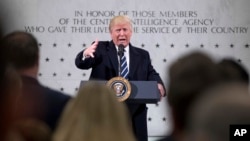The National Security Agency risks a brain drain of hackers and cyberspies because of a tumultuous reorganization and worries about the acrimonious relationship between the intelligence community and President Donald Trump, according to current and former NSA officials and cybersecurity industry sources.
Six cybersecurity executives told Reuters they had witnessed a marked increase in the number of U.S. intelligence officers and government contractors seeking employment in the private sector since Trump took office on January 20.
One of the executives, who would speak only on condition of anonymity, said he was stunned by the caliber of the would-be recruits. They are coming from a variety of government intelligence and law enforcement agencies, multiple executives said, and their interest stems in part from concerns about the direction of U.S intelligence agencies under Trump.
Retaining and recruiting talented technical personnel has become a top national security priority in recent years as Russia, China, Iran and other nation states and criminal groups have sharpened their cyberoffensive abilities. The NSA and other intelligence agencies have long struggled to deter some of their best employees from leaving for higher-paying jobs in Silicon Valley and elsewhere.
Two-year reorganization plan
The problem is especially acute at the NSA, current and former officials said, because of a reorganization known as NSA21 that began last year and aims to merge the agency's electronic eavesdropping and domestic cybersecurity operations.
The two-year overhaul includes expanding parts of the NSA that deal with business management and human resources and putting them on par with research and engineering. The aim is to "ensure that we're using all of our resources to maximum effect to accomplish our mission," NSA Director Mike Rogers said.
The changes include new management structures that have left some career employees uncertain about their missions and prospects. Former employees say the reorganization has failed to address widespread concerns that the agency is falling behind in exploiting private-sector technological breakthroughs.
A former top NSA official said he had been told by three current officials that budget problems meant there was too little money for promotions. That is especially important for younger employees, who sometimes need two jobs to make ends meet in the expensive Washington, D.C., area, the official said.
"Morale is as low as I've ever seen it," said another former senior NSA official, who maintains close contact with current employees.
Asked about the risk of losing talent from the NSA and other agencies, White House spokesman Michael Anton said Trump had sought to reassure the intelligence community by visiting the CIA headquarters on his first full day in office. He also pointed to the military spending increase in Trump's budget proposal released Monday.
Trump's attacks
But it will most likely take more than a visit to the CIA to patch up relations with the intelligence community, the current and former officials said.
Trump has attacked findings from intelligence agencies that Russia hacked emails belonging to Democratic Party operatives during the 2016 presidential campaign to help him win, though he did eventually accept the findings.
In January, Trump accused intelligence agencies of leaking false information and said it was reminiscent of tactics used in Nazi Germany.
The breadth of any exodus from the NSA and other intelligence agencies is difficult to quantify.
The NSA has "seen a steady rise" in the attrition rate among its roughly 36,000 employees since 2009, and it now sits at a "little less than 6 percent," according to an NSA spokesman.
The NSA's Rogers said last year that the attrition rate was 3.3 percent in 2015, suggesting a sharp jump in departures since then.
Several senior NSA officials who have left or plan to leave, including Deputy Director Richard Ledgett and the head of cyberdefense, Curtis Dukes, have said their departures were unrelated to Trump or the reorganization.
Some turnover is normal with any new administration, government and industry officials noted, and a stronger economy has also improved pay and prospects in the private sector.
"During this time the economy has been recovering from the recession, unemployment rates have been falling and the demand for highly skilled technical talent has been increasing," an NSA spokesman said when asked to comment on the reports of employee departures.
In a statement, Kathy Hutson, the NSA's chief of human resources, said the agency continues "to attract amazing talent necessary to conduct the security mission the nation needs."
Rogers' style
Some NSA veterans attribute the morale issues and staff departures to the leadership style of Rogers, who took over the spy agency in 2014 with the task of dousing an international furor caused by leaks from former contractor Edward Snowden.
Concern about Rogers reached an apex last October, when former Defense Secretary Ash Carter and former Director of National Intelligence James Clapper recommended to then-President Barack Obama that Rogers be removed.
The NSA did not respond to a request for comment on the recommendation last fall that Rogers be replaced.
Rogers is now expected to retain his job at NSA for at least another year, according to former officials.
Rogers acknowledged concerns about potential morale problems last month, telling a congressional committee that Trump's broadsides against the intelligence community could create "a situation where our workforce decides to walk."
Trump's criticism of the intelligence community has exacerbated the stress caused by the reorganization at the NSA, said Susan Hennessey, a former NSA lawyer now with the Brookings Institution, a Washington policy research group.
The "tone coming from the White House makes an already difficult situation worse, by eroding the sense of common purpose and service," she said.
A wave of departures of career personnel, Hennessey added, "would represent an incalculable loss to national security."








